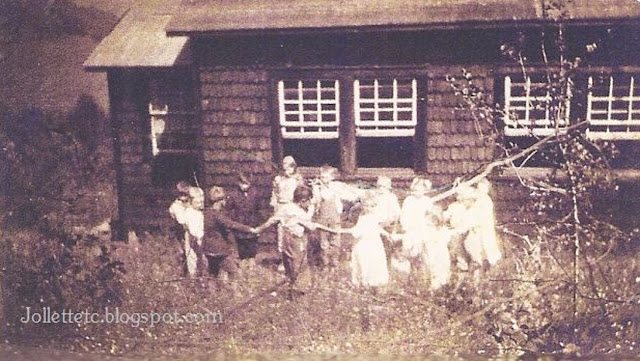Sepia Saturday challenges bloggers to share family history
through old photographs.
This week’s Sepia Saturday prompt featuring children joining
hands to play a circle game reminds me of an old photo of children at play
outside the Frazier Mountain School.
Frazier Mountain was the stomping grounds of my 3X great-grandmother
Nancy Frazier Shiflett and her many aunts and uncles and cousins. However, the
photo is not THAT old, more likely from the very early 1900s.
 |
| Frazier Mountain School photo courtesy of John and Janet Thompson descendant of Henry Timber Frazier, son of Miley Frazier |
That is when the settlement movement made its way to the
mountains of Virginia. The aim of settlement schools was to provide education
for children in rural and mountain areas that were often not served by the
county, usually for economic and logistical reasons. Churches often filled the
gap building a school, a church, a clothing bureau, and sometimes even a hospital.
Frederick William Neve was an Episcopal minister born and
educated in England who was asked to come to Virginia. He was based in the town
of Ivy in Albemarle County, but he was drawn to the Blue Ridge Mountains just
twenty-five miles away. He found someone to take him into those mysterious
communities – Shifflett’s Hollow, Bacon Hollow, Mutton Hollow, Blackwell Hollow,
and Simmons Gap – places that inspired stories of backwoods justice and
suspicion towards strangers.
There were probably 175 people living there, but
reportedly only two of them could read and write. Neve inquired about the
mountain community and learned that no school or church existed within miles of
the area known as “Frazier Mountain” to the locals but previously as “Lost
Mountain.” Neve actually liked that name because he reasoned that without religion
and education, the people were indeed “lost.” (Today it is known as “Loft
Mountain.”)
So Neve looked for a location for a mission school and bought
some property straddling Greene and Albemarle counties. Between 1890 and 1912,
Neve started twenty missions, ten of them in Greene County alone. He continued
to work with the mountain people building mission schools and churches throughout
seven Virginia counties. Frederick Neve is remembered today as the founder of
the mountain mission movement of the Episcopal Church in Virginia, 1888-1948.
Neve’s most ambitious mission project was the co-ed Blue Ridge Industrial School, which offered more advanced education beyond the elementary
level. Since most students were likely to remain in a rural area, the school
provided practical training for farm life and related occupations. The school
even operated a cannery for a number of years. BRIS was the first accredited
high school in Greene County.
Today all of the mission schools have closed except for the
Blue Ridge school which is still going strong as a boarding school for boys.
Join hands and circle around to Sepia Saturday for more
fun and games.
Sources:
Alvic, Philis. Weavers
of the Southern Highlands. Lexington, KY: U of Kentucky, 2003. University
Press of Kentucky. Web. 25 Nov. 2015.
<https://books.google.com/books?id=G6geBgAAQBAJ&dq=southern+highland+weavers&source=gbs_navlinks_s>.
Campbell, Olive D. Southern Highland Schools Maintained by Denominational and Independent
Agencies. New York: Russell Sage Foundation, 1921. 30 July 2009. Web. 25
Nov. 2015.
<https://books.google.com/books?id=c4p6V571x2QC&dq=frazier+mountain+school+virginia&source=gbs_navlinks_s>.
Covey, David D. Greene
County, Virginia: A Brief History. Google Books. The History Press,
n.d. Web. 26 Nov. 2015.
<https://books.google.com/books?id=kkzjkVKswewC&dq=neve%2Band%2Bblue%2Bridge%2Bschools&source=gbs_navlinks_s>.
"A Guide to the Frederick W. Neve Papers, 1854-1981
(bulk 1900-1940) Neve, Frederick W., Papers 10505." Virginia
Heritage: Guides to Manuscripts and Archival Collections in Virginia. Virtual
Library of Virginia, n.d. Web. 25 Nov. 2015.
<http://ead.lib.virginia.edu/vivaxtf/view?docId=uva-sc%2Fviu03549.xml>.
“Settlement School.” Wikipedia:
The Free Encyclopedia. Wikimedia
Foundation, Inc. 13 Aug. 2015. Web. 25 Nov. 2015.
Shifflett, Larry. "County Place Names." Shiflett
Family Genealogy. Robert V. Klein, n.d. Web. 26 Nov. 2015.
<http://www.klein-shiflett.com/shifletfamily/PS/alpnames.html>.


How fascinating! I hadn't heard of settlement schools, but it makes perfect sense to start them. What a great accomplishment Neve did with the 10 schools he started! So much history in them I bet; too bad all but one closed.
ReplyDeletebetty
What a remarkable man, that Frederick Neve. And I'm glad you have at least ONE of those schools still standing...
ReplyDeleteWhat an interesting post about a rather remarkable man. I love the names of some of those communities. Is that what the Americans call "Hillbillies"
ReplyDeleteA perfect photo to match the orompt, and very interesting to read about the settlement school movement.
ReplyDeleteA super photo for the theme and a fascinating introduction to one of America's rural education efforts. Today we drive through the mountains on the great interstate system never realizing how isolated those communities hidden in the hollows and ridges once were.
ReplyDeleteExcellent photo for the theme and interesting history. I like how "lost" ended up as "loft" with only one letter difference.
ReplyDeleteWhat a great photo for the theme and very interesting information.
ReplyDeleteGiven the number of circle games played by children through the ages, it shouldn’t come as a surprise that you have almost the perfect match to the prompt image; the history behind it however, is unique and fascinating.
ReplyDeleteVery interesting history and inspirational. I love those town names, they sound like something out of a book. There is a series of books referred to as the Mitford series about an Episcopal priest in the Carolinas who adopts a homeless child from a rural community that sounds similar. I wonder if the author knew about or was inspired by Fr. Neve.
ReplyDeleteAgree with all previous comments, just want to thank you for posting about these schools, and how many rural mountain communities have benefited from education...though usually as the children grew up, they would leave the mountains and move to town where there were more opportunities. Still true today.
ReplyDelete